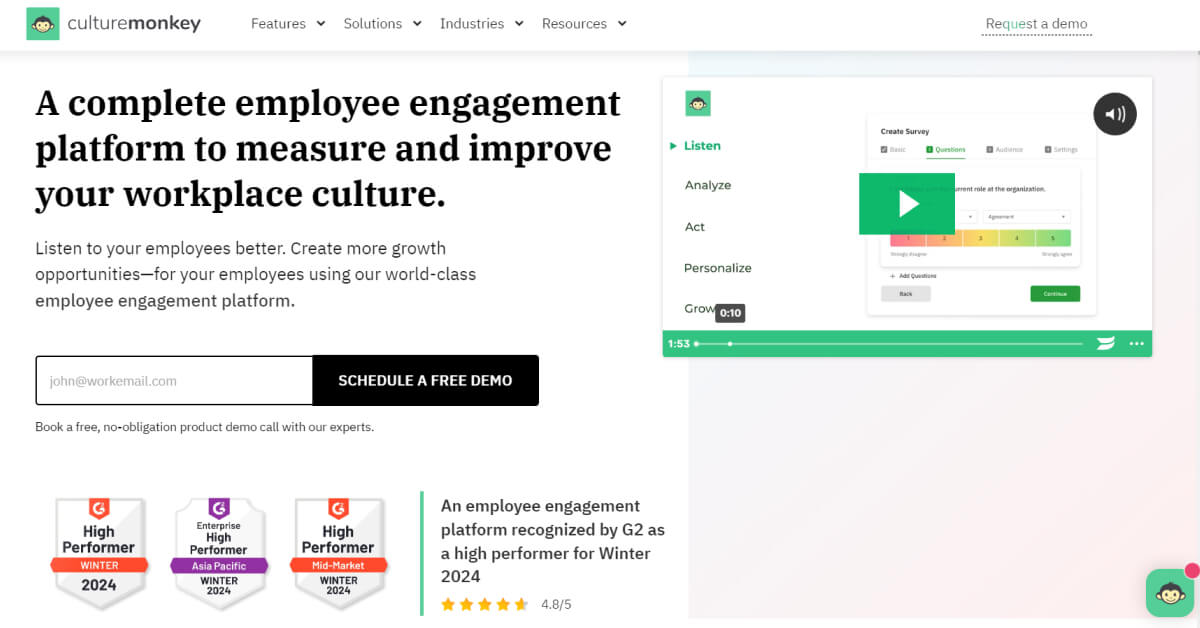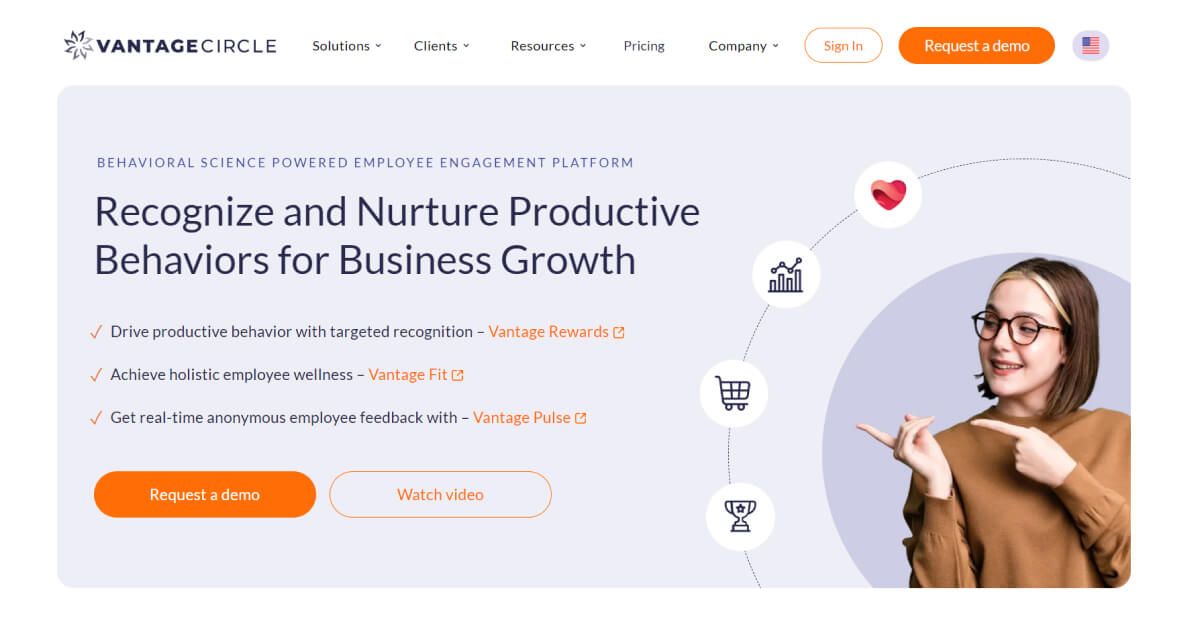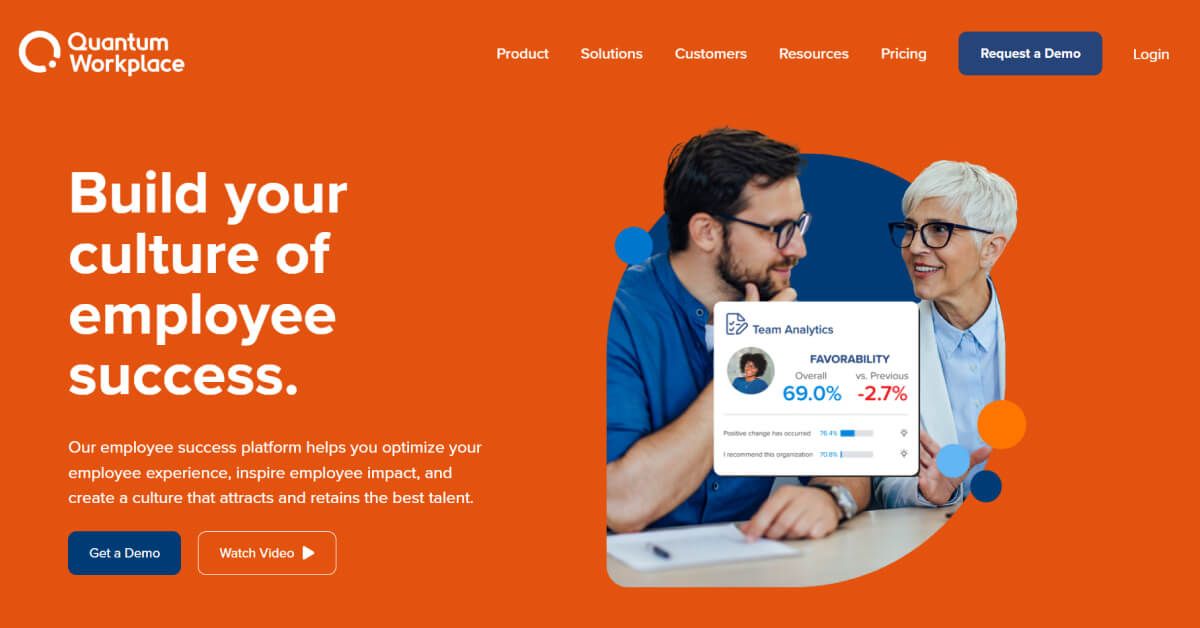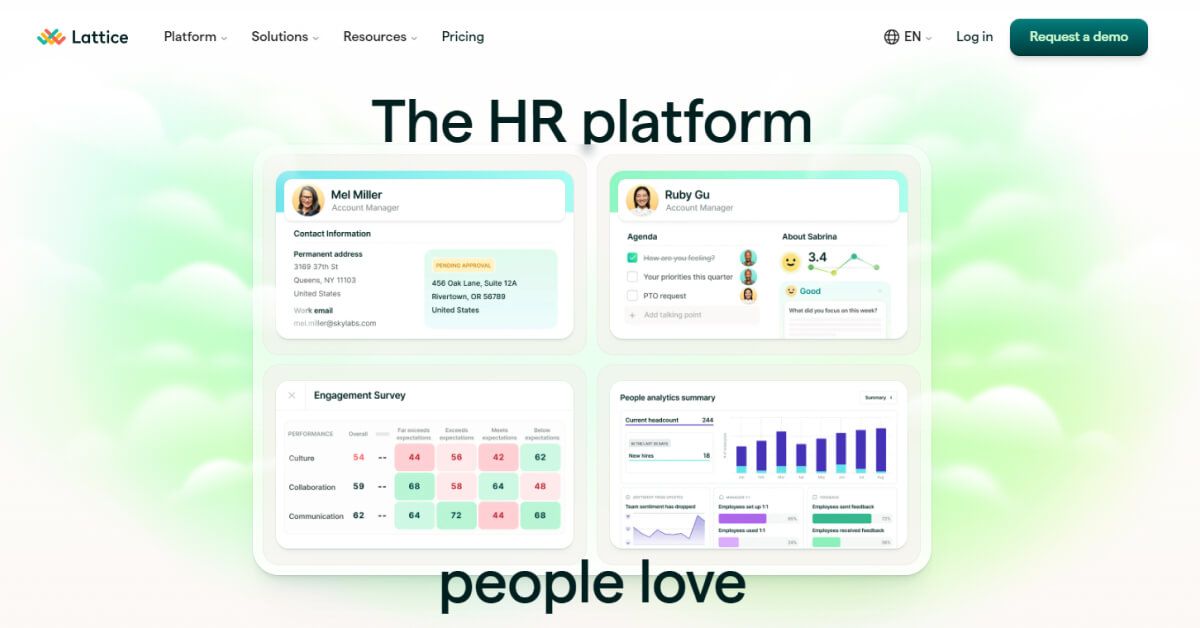50+ Benefits of employee engagement: Empowering your team with its path to peak productivity

In 2008, when Starbucks faced declining sales, the company took a bold step—CEO Howard Schultz temporarily closed 7,100 stores to retrain baristas to make the perfect espresso. Why? Schultz recognized that disengaged employees were impacting their experience.
The retraining wasn’t just about coffee; it was a statement that every team member mattered and their contributions directly influenced the brand’s success.
The result? Baristas felt re-energized and more connected to their roles, leading to a revived sense of purpose across stores. Customer satisfaction improved, and Starbucks experienced a notable turnaround in revenue, job satisfaction, and loyalty. This story underscores how investing in employee engagement pays off—boosting morale, refining skills, and driving business success.
It’s a testament to how understanding and addressing employee emotional needs can steer a company through tough times and onto a path of renewed growth. So, why do you need to tap into similar techniques to foster engagement in your workplace? Let’s explore employee engagement benefits.
What is employee engagement and its importance?

Employee engagement refers to the emotional commitment employees have toward their work and the organization they are part of. It goes beyond job satisfaction or simple participation; it’s about how connected and motivated employees feel to contribute meaningfully. Engaged employees are proactive, take ownership of their responsibilities, and align their efforts with the company’s broader goals.
The importance of staff engagement can’t be overstated. Organizations with high engagement levels see measurable improvements in productivity, lower turnover rates, and higher profitability.
Engaged employees are more likely to innovate, collaborate, and go the extra mile, which boosts overall company performance. They also enhance customer satisfaction, as their enthusiasm and commitment shine through in their work, resulting in better customer interactions.
A highly engaged workforce creates a positive engagement, leading to stronger collaboration and long-term loyalty. In a competitive business environment, employee engagement benefit is critical for sustained growth and success.
Why engagement matters at the company level?

Regardless of the industry, employee engagement has a significant impact. Highly engaged employees are more productive, provide better customer service, have higher retention rates, and positively impact the bottom line.
In contrast, less engaged employees can lead to poor performance, high turnover rates, and increased costs. By prioritizing employee engagement, you can create a positive work environment, foster a culture of innovation, and achieve your business goals.
Here are how a few industries that benefit from employee engagement and thereby have faster growth even in tough times:
Financial industry
The financial service industry is a fast-paced and competitive field that demands high employee engagement levels. Employee engagement is particularly crucial in the financial industry because of its impact on the bottom line.
Customer trust and loyalty are critical in the financial industry, and employee engagement plays a significant role in building these relationships.
An engaged employee is more likely to go above and beyond for their customers, resulting in higher customer satisfaction rates and loyalty. This, in turn, leads to more significant revenues and profitability for the financial institution.
Here is a case study on how CultureMonkey drives team engagement in a Fin-Tech company.
Financial Services Case Study CultureMonkey by Kailash on Scribd
Retail industry
In the retail industry, employee engagement is crucial to maintaining customer satisfaction and loyalty, increasing sales, and driving profitability. Engaged employees are more likely to provide excellent customer service, resulting in higher customer satisfaction rates and increased sales.
Utilizing tools like sales navigator search filters can help identify and target potential high-performing employees who can further enhance customer engagement and drive business growth.
In addition, engaged employees are more likely to stay with their organization, reducing the costs associated with turnover and improving the business's overall stability.
The retail industry is highly competitive, and employee engagement can provide a competitive advantage. Engaged employees are more likely to be productive, innovate, and come up with new ideas that can drive business growth and success.
Here is a case study on how CultureMonkey drives employee engagement and reduces attrition in a Retail company.
Retail Case Study CultureMonkey by Santhosh Kumar on Scribd
Manufacturing industry
Engaged employees are more likely to be productive, innovative and provide higher-quality work in manufacturing industries.
Employee engagement is essential to maintaining product quality and meeting production goals in the manufacturing industry. Engaged employees are more likely to take ownership of their work and feel a sense of pride in their contributions, resulting in higher-quality products and increased productivity.
Furthermore, employee engagement is critical for creating a safe work environment in the manufacturing industry. Engaged employees are likely to follow safety procedures and protocols, reducing the risk of workplace accidents and injuries.
Here is a case study on how CultureMonkey helps identify trends in employee attrition in Manufacturing companies.
Manufacturing Industry Case Study CultureMonkey by Santhosh Kumar on Scribd
Healthcare industry
In the healthcare industry, employee engagement is just as crucial as in the manufacturing sector.
Imagine a world where healthcare professionals are not just going through the motions, but actively invested in their work.
Engaged healthcare employees bring a whole array of benefits to the table. They're more likely to be productive, innovative, and deliver top-notch care.
When healthcare professionals feel a sense of ownership and pride in their contributions, patient outcomes improve, and the quality of care skyrockets.
Moreover, in an industry where safety is paramount, engaged employees are the ultimate allies. They diligently follow protocols and procedures, significantly reducing the risk of accidents and injuries.
Technology
In the fast-paced and ever-evolving world of technology, employee engagement is the secret sauce for staying ahead in the game.
Engaged tech professionals are like the magicians of innovation, conjuring up groundbreaking solutions and pushing the boundaries of what's possible.
When tech employees feel connected to their work and the company's mission, they become more productive and driven to excel. Innovation thrives in an environment where creativity is nurtured, and engaged employees bring fresh perspectives and ingenious ideas to the table.
Moreover, in an industry known for its talent war, employee engagement becomes the armor against turnover. Retaining top tech talent is easier when they feel valued and supported in their roles.
Automotive industry
High employee engagement in the automotive industry is essential for upholding quality, fostering innovation, and ensuring customer satisfaction, as it cultivates a sense of pride in workmanship and results in vehicles that meet or exceed expectations.
Employee engagement also plays a vital role in fostering a culture of continuous improvement and innovation, driving advancements in technology, design, and manufacturing processes. This, in turn, enables automotive companies to stay competitive in the ever-evolving market and meet the demands of discerning consumers.
By prioritizing employee engagement, automotive companies can create a work environment where employees feel valued, motivated, and committed to producing high-quality vehicles while prioritizing safety.
What is the main purpose of employee engagement?

Ah, the elusive enigma of employee engagement! You might be wondering, "What's the main purpose behind this buzzword that's been circulating like wildfire in the corporate world?" Well, let's unravel the mystery together!
The main purpose of employee engagement is like a compass guiding organizations toward success. At its core, it's all about creating a workplace where employees feel a genuine connection to their roles, their teams, and the company's mission.
It's not just about having happy-hour Fridays or a foosball table in the breakroom (though those are nice perks!). It's about fostering a sense of purpose, pride, and passion in the hearts of the workforce.
Engaged employees are like the dream team every company dreams of having. They are motivated, committed, and willing to go the extra mile to achieve greatness. When employees are engaged, they don't just work for a paycheck; they work for a purpose. And that purpose can move mountains.
Think about it! Engaged employees are more productive, innovative, and customer-focused. They take ownership of their work, become brand ambassadors, and deliver exceptional results. They're not afraid to speak up with ideas and solutions, knowing their voices are heard and valued.
But it's not a one-sided affair. Companies that prioritize employee engagement reap the rewards of higher retention rates, lower absenteeism, and increased profitability. It's a win-win situation!
So, there you have it—the main purpose of employee engagement is to create a workplace where employees are connected, inspired, and eager to make a difference.
The Employee Engagement Model
The Employee Engagement Model outlines the key factors that contribute to creating an engaged and motivated workforce. It helps organizations understand how to foster engagement and improve overall employee performance. Here’s a breakdown of the model:
- The psychological contract: This aspect of the model focuses on the mutual expectations between employees and the organization. When employees feel that their needs for growth, recognition, and work-life balance are met, they are more likely to be engaged. Conversely, when expectations are unmet, disengagement can occur. Building and maintaining a strong psychological contract is key to fostering long-term engagement.
- The engagement drivers: These are the core factors that influence employee engagement. Key drivers include leadership quality, employee communication, recognition, career development opportunities, and a supportive work environment. When these drivers are aligned with employees’ needs and values, it creates a sense of purpose and belonging, leading to higher engagement levels.
- The outcomes of engagement: Engaged employees contribute to better organizational outcomes. The model highlights that when employees are engaged, they tend to be more productive, demonstrate higher levels of job satisfaction, and are more likely to stay with the company. This, in turn, reduces turnover, improves customer service, and drives business growth.
How does engagement influence employee performance?

You see, engaged employees aren't just clock punchers; they're like eager athletes sprinting toward the finish line of success. When employees feel a deep sense of connection to their work and the company's purpose, they unleash their full potential.
It's like the domino effect of excellence. Engaged employees are more focused, driven, and committed to delivering top-notch results. They take pride in their contributions and strive for continuous improvement.
But hold on, there's more! Employee engagement also boosts creativity and innovation. When employees are emotionally invested in their roles, they feel comfortable exploring new ideas and taking calculated risks.
The impact on the overall workplace culture is phenomenal. Engaged employees inspire their peers and create a positive ripple effect. Suddenly, you've got a team of enthusiastic go-getters, all fueling each other's brilliance.
And the best part? When performance rises, so does productivity and customer satisfaction. Engaged employees are attentive to the needs of clients and go above and beyond to exceed expectations.
50+ Key benefits of employee engagement that you should know

Now, irrespective of the industry, here are 50+ crucial employee engagement benefits:
- Increased productivity: Engaged employees are more focused, motivated, and dedicated to their tasks, which directly leads to higher productivity. They take initiative, work efficiently, and contribute more consistently toward meeting company goals. With fewer distractions and a sense of ownership, they drive better results.
- Lower absenteeism: Effects of employee engagement significantly reduces absenteeism as engaged employees are more committed and less likely to take unnecessary leave. They are present not just physically but mentally, reducing productivity gaps caused by frequent absences. This leads to smoother workflows and better team performance.
- Employee retention: A highly engaged workforce experiences lower turnover because employees feel valued and fulfilled in their roles. Engaged employees are less likely to look for external opportunities, saving the company costs on recruitment and training.
- Innovation: Engaged employees tend to be more innovative, as they feel a sense of ownership and responsibility toward the company’s success. They’re more likely to come up with creative solutions, improving processes, products, and services to give the business a competitive edge.
- Turnover: High employee engagement leads to reduced turnover rates, ensuring that talent stays within the organization. When employees are satisfied and motivated, they remain loyal, preventing the company from losing valuable skills and expertise.
- Higher retention: Companies with strong employee engagement retain employees for longer periods, leading to a stable workforce. Retaining engaged employees helps maintain organizational knowledge and reduces the disruption caused by frequent staff changes.
- Effective leadership: Engaged employees are more responsive to leadership and contribute positively to their teams. They are more likely to take initiative and demonstrate leadership qualities, inspiring others and helping the company cultivate a strong leadership pipeline.
- Improved organizational culture: Employee engagement fosters a positive and collaborative organizational culture. Engaged employees support each other and contribute to a work environment that promotes respect, communication, and shared values, enhancing overall company morale.
- Job satisfaction: When employees are engaged, they experience higher levels of job satisfaction. They feel their work is meaningful and appreciated, which boosts their motivation and long-term commitment to the organization.
- Profitability: Engaged employees drive profitability by working efficiently, reducing costs associated with turnover, and boosting productivity. The alignment of employee efforts with business goals leads to better financial performance across the board.
- Ensuring employee loyalty: Engagement is a key driver of employee loyalty. When employees feel supported and valued, they are more likely to stay loyal to the company, reducing the risk of losing key talent to competitors.
- Grows revenue: With increased productivity, innovation, and better customer service, staff engagement directly contributes to revenue growth. Engaged employees are focused on delivering value, which results in improved business outcomes and revenue generation.
- Improved collaboration: Engaged employees communicate more effectively and work better with others. This collaboration leads to stronger teamwork and problem-solving, allowing the organization to achieve its goals more efficiently.
- Better quality: When employees are engaged, they take pride in their work and pay attention to detail, resulting in higher-quality outputs. Their dedication ensures that the products and services meet or exceed standards, leading to customer satisfaction.
- Career development: Engaged employees are proactive in seeking opportunities for career development. They are more likely to participate in training and development programs, advancing their skills and contributing to the company’s long-term success.
- Enhanced teamwork: Employee engagement improves teamwork by fostering open communication and mutual respect. Engaged teams are more cohesive, work toward shared goals, and support each other in achieving success.
- Less workplace stress: A supportive and engaging work environment reduces stress levels among employees. When they feel valued and understand their role in the organization, they experience less anxiety, leading to better mental health and job satisfaction.
- Attract new talent: Companies with a strong engagement culture are more attractive to top talent. Prospective employees are drawn to organizations that promote a positive work environment, boosting recruitment efforts and reducing hiring costs.
- Better customer service: Engaged employees are more likely to provide exceptional customer service. Their dedication to the company translates into better interactions with customers, leading to increased satisfaction and loyalty.
- Greater employee commitment: Engagement fosters a sense of commitment, where employees are aligned with the company’s mission and values. This commitment leads to better performance, as employees are motivated to contribute to the company’s long-term success.
- Increased customer satisfaction: Engaged employees lead to happier customers. When employees are motivated and committed, they provide better service, resulting in higher customer satisfaction rates and stronger customer retention.
- Healthier employees: Engagement is linked to improved employee health, both physically and mentally. Engaged employees are less likely to experience burnout, stress, or workplace-related health issues, contributing to a healthier and more productive workforce.
- Safety: Engaged employees are more aware and proactive about safety in the workplace. They take the necessary precautions and follow procedures to ensure a safe environment, reducing the risk of accidents and promoting well-being.
- Decreased burnout: Engaged employees experience lower levels of burnout as they are more balanced and fulfilled in their roles. They manage their workload effectively, maintain a healthier work-life balance, and feel less overwhelmed by daily demands.
- Improved employee well-being: Engaged employees are more likely to maintain a healthy work-life balance, resulting in improved overall well-being. They are less prone to stress-related illnesses and burnout, which leads to fewer health-related absences and higher workplace satisfaction.
- Stronger brand advocacy: Engaged employees are more likely to become brand advocates, promoting the company’s values and culture outside the workplace. Their positive outlook can boost the company’s reputation, attracting new customers and talent through word of mouth.
- Higher motivation: When employees feel connected and valued, their motivation levels rise. This sense of motivation translates into better performance, as employees are eager to contribute their best efforts to achieve company goals.
- Improved decision-making: Engaged employees are more invested in their roles, making them more thoughtful and strategic in their decision-making. Their deeper understanding of the company’s mission allows them to make choices that align with organizational goals.
- Faster adaptation to change: Engaged employees are more adaptable and open to change. Whether it’s new technologies or processes, they are quicker to embrace change because they trust the organization’s direction and want to contribute to its success.
- Enhanced problem-solving: With higher engagement, employees are more likely to engage in creative problem-solving. They actively seek out ways to improve processes and overcome challenges, helping the organization stay competitive.
- Increased accountability: Engaged employees take greater responsibility for their work. They hold themselves accountable for meeting deadlines, achieving goals, and ensuring their work aligns with the company’s standards and expectations.
- More positive workplace atmosphere: Engaged employees contribute to a positive and energetic workplace environment. Their enthusiasm is contagious, encouraging a culture of collaboration and optimism that improves overall morale.
- Higher employee morale: When employees feel engaged, their morale naturally increases. This boost in morale leads to higher levels of job satisfaction and a more vibrant workplace, which benefits both the employees and the organization.
- Better use of resources: Engaged employees make better use of company resources. They are more conscious of their actions and focus on utilizing resources—time, tools, and talent—efficiently, reducing waste and maximizing output.
- Lower costs of recruitment: A highly engaged workforce leads to lower turnover, reducing the frequency of recruiting and onboarding new employees. This directly lowers the costs associated with recruitment, making it a more sustainable approach for long-term business success.
- Stronger alignment with business goals: When employees are engaged, they better understand and align their efforts with the company’s overall business goals. This alignment ensures that everyone is working toward the same objectives, improving operational efficiency and achieving long-term success.
- Higher emotional investment: Engaged employees are emotionally invested in the company’s success. This emotional connection leads to a stronger commitment to the company’s values and a deeper desire to see the organization grow and thrive.
- Boosted creativity: Engaged employees often demonstrate higher levels of creativity, bringing fresh ideas to the table. Their enthusiasm for their roles fuels innovative thinking that drives organizational growth and competitive differentiation.
- Improved employee advocacy: Engaged employees actively promote the organization as a great place to work. They recommend the company to potential hires and endorse its products and services to others, amplifying the employer brand.
- Stronger employee engagement feedback loop: Engaged employees are more likely to participate in employee engagement surveys and provide constructive feedback. This helps organizations better understand employee needs and continually improve workplace policies.
- Higher adaptability to new roles: Engaged employees embrace new roles or responsibilities with a positive attitude, facilitating smoother transitions. Their openness and readiness to learn enhance organizational agility.
- Enhanced organizational resilience: A workforce with high engagement can better withstand challenges. Their commitment and positivity provide stability, helping the organization adapt and thrive during difficult times.
- Increased organizational trust: Engaged employees are more likely to trust leadership and company decisions. This trust fosters loyalty, minimizes resistance to change, and creates a cohesive workplace environment.
- Stronger peer relationships: Employee engagement strengthens interpersonal connections among colleagues, building trust and collaboration. These positive relationships enhance teamwork and foster a supportive company culture.
- Improved work ownership: Engaged employees take greater ownership of their tasks, ensuring accountability and quality. Their proactive approach drives efficiency and minimizes errors.
- Higher confidence levels: Engaged employees exude confidence in their work, influencing others positively. Their self-assurance encourages a culture of success and motivates teams to achieve collective goals.
- Greater pride in work: Employees who are engaged take immense pride in their roles and contributions. This pride reflects in their performance and inspires others to uphold high standards.
- Sustained long-term vision: Engaged employees are invested in the company’s future and actively work toward its vision. Their alignment with long-term goals ensures consistent progress.
- Elevated company reputation: The presence of engaged employees enhances the organization’s reputation as a desirable workplace, attracting clients, partners, and top talent.
- Reduction in conflicts: Engaged employees are more empathetic and understanding, leading to fewer workplace conflicts. Their collaborative mindset ensures harmonious interactions across teams.
- Improved onboarding experiences: New hires in an engaged workplace benefit from a positive environment, easing their transition. Engaged employees often support onboarding efforts, fostering inclusivity and belonging.
- Stronger cross-departmental synergy: Employee engagement promotes better collaboration across departments, breaking silos and driving shared success. Teams work more cohesively toward organizational objectives.
- Heightened sense of purpose: Engaged employees connect their daily tasks to broader company goals, experiencing a stronger sense of purpose. This alignment energizes their efforts and enhances job fulfillment.
Whose job is employee engagement?

Employee engagement isn’t the responsibility of a single department or individual—it’s a shared effort that requires participation at multiple levels. Many organizations struggle with this question: Who owns employee engagement?
The truth is, everyone in the organization plays a role, from top-level management to HR and even the employees themselves. Let’s break down the responsibilities across different roles.
1. Leadership’s role in driving engagement
Engagement starts at the top. Leadership sets the tone for the company culture and influences how employees feel about their work. Engaged leaders lead by example—they communicate openly, support professional development, and create an environment where employees feel valued.
When leadership prioritizes and engage employees, it trickles down throughout the organization, shaping how managers and employees interact.
2. HR’s responsibility in fostering employee engagement
HR plays a critical role in building structured employee engagement strategies. From developing onboarding programs to creating recognition and reward systems, HR ensures that engagement is embedded in the company’s processes.
They are also responsible for gathering employee feedback\ and acting on it to continuously improve engagement levels. By working closely with management and employees, HR acts as the bridge to maintain a thriving, engaged workforce.
3. Managers as key players in day-to-day engagement
Managers are the closest point of contact for employees, making them crucial in the day-to-day execution of engagement efforts. They are responsible for providing regular feedback, recognizing achievements, and offering growth opportunities.
Managers create direct impact by maintaining a positive and motivating environment, helping employees stay aligned with company goals. Their ability to lead with empathy and motivate employees directly influences engagement levels.
4. Employees’ role in their own engagement
While leadership, HR, and managers have significant responsibilities, employees also play an active role in their own engagement. Engaged employees take initiative, communicate openly, and contribute to a positive work environment.
They seek opportunities for growth and align their goals with the company’s mission. Employee engagement thrives when individuals actively participate in creating a collaborative, engaged culture, working hand in hand with leadership and management.
How to improve employee engagement in your team?

Improving employee engagement within your team requires a strategic and proactive approach aimed at addressing the unique needs and motivations of your employees. By implementing targeted initiatives and fostering a culture of engagement, you can enhance morale, productivity, and overall team performance.
Here are some effective strategies to improve employee engagement in your team:
- Foster open communication: Encourage open and transparent communication channels within your team. Create opportunities for employees to share their ideas, concerns, and feedback openly. Actively listen to their input, address their questions and concerns, and involve them in decision-making processes whenever possible.
- Provide clear expectations: Clearly define roles, responsibilities, and expectations for each team member. Ensure that everyone understands their objectives, deadlines, and performance metrics. Clear expectations help reduce ambiguity and confusion, allowing employees to focus on their work and contribute effectively to the team's goals.
- Offer growth opportunities: Invest in your employees' professional development by providing opportunities for learning and growth. Offer training programs, workshops, and mentorship opportunities to help employees develop new skills and advance in their careers. Encourage employees to set personal and professional goals and support them in achieving their aspirations.
- Recognize and reward achievement: Acknowledge and appreciate your team members' contributions and achievements regularly. Recognize their hard work, dedication, and accomplishments publicly to boost morale and motivation. Consider implementing a formal employee rewards and recognition program to incentivize high performance and encourage a culture of appreciation.
- Promote work-life balance: Support your team members' well-being by promoting work-life balance initiatives. Encourage employees to take breaks, use their vacation time, and disconnect from work outside of office hours. Offer flexible work arrangements, such as remote work options or flexible scheduling, to accommodate employees' personal needs and preferences.
- Build trust and collaboration: Foster a culture of trust, collaboration, and mutual respect within your team. Encourage teamwork, cooperation, and knowledge sharing among team members. Create opportunities for team-building activities, collaborative projects, and cross-functional initiatives to strengthen relationships and camaraderie.
- Lead by example: Lead by example and demonstrate the behaviors and values you want to see in your team. Be approachable, supportive, and accessible to your team members. Set high standards for yourself and hold yourself accountable for your actions. Your leadership style and behavior have a significant impact on your team's engagement and morale.
- Solicit feedback and act on it: Regularly seek feedback from your team members about their experiences, challenges, and suggestions for improvement. Actively listen to their feedback, take their concerns seriously, and take action to address any issues or areas for improvement. Involve employees in the decision-making process and empower them to contribute to positive changes within the team.
- Promote a positive work environment: Create a positive and inclusive work environment where all team members feel valued, respected, and appreciated. Encourage positivity, optimism, and a sense of belonging among your team members. Celebrate successes, milestones, and achievements together to foster a sense of camaraderie and team spirit.
- Encourage autonomy: Empower your team members by allowing them to take ownership of their tasks and make decisions within their roles. Providing autonomy fosters a sense of trust and responsibility, boosting engagement and confidence.
- Celebrate small wins: Acknowledge and celebrate even the smaller achievements within your team. Recognizing progress, no matter how minor reinforces motivation and helps maintain a consistent sense of accomplishment.
- Provide meaningful work: Align team members’ responsibilities with their skills and interests to make their work more meaningful. Help them understand how their contributions impact the organization's larger goals, increasing employee engagement and satisfaction.
- Cultivate diversity and inclusion: Promote a culture that values diversity and inclusion within your team. Encourage different perspectives, provide equal opportunities, and create a safe space for employees to express themselves authentically.
What are the drivers of employee engagement?

- Leadership support:Employees are more engaged when leadership provides clear direction, support, and transparency in decision-making.
- Open communication: Effective two-way communication fosters trust and keeps employees informed, helping them feel valued and connected to the organization.
- Career development opportunities: Offering growth and learning opportunities keeps employees motivated and aligned with their long-term career goals.
- Recognition and rewards: Frequent acknowledgment of employee achievements increases morale and drives engagement by making employees feel appreciated.
- Work-life balance: Flexible working arrangements and support for personal needs contribute to higher engagement by reducing stress and burnout.
- Company culture: A positive, inclusive workplace culture creates a sense of belonging, encouraging employees to stay engaged and productive.
- Manager relationships: Strong relationships with managers based on trust and mutual respect significantly influence day-to-day engagement levels.
- Job role clarity: When employees clearly understand their roles and responsibilities, they are more focused and engaged in their tasks.
- Team collaboration: Engagement improves when employees work in collaborative teams that promote creativity, support, and shared goals.
- Autonomy: Providing employees with the freedom to make decisions about their work boosts motivation and job satisfaction.
- Employee voice: Engagement increases when employees feel their opinions and feedback are heard and acted upon by leadership.
- Workplace environment: A comfortable and safe physical or virtual workplace enhances employee well-being and overall engagement.
- Purpose and meaning: Employees are more engaged when they understand how their work contributes to the organization’s mission and goals.
Whose job is employee engagement?
We all know why is employee engagement important in a thriving workplace but whose job is it? While many people might assume it’s solely the responsibility of HR or managers, employee engagement is a shared responsibility that spans across the organization. Here's how different roles contribute to an effective employee engagement:
- HR’s role in employee engagement: Human Resources plays a pivotal role in setting the foundation for employee engagement. They are responsible for designing engagement programs, implementing employee surveys, and creating initiatives that promote a positive work environment. HR ensures that employees’ needs are heard and addressed.
- Managers and leaders’ involvement: Managers are on the front lines when it comes to engagement. They directly influence employee morale, productivity, and motivation. Managers should build strong relationships with their teams, provide feedback, and create an environment where employees feel valued and supported.
- Employees' responsibility: Employee engagement is not just the responsibility of the employer. Employees must take ownership of their roles, stay proactive, and communicate their needs, goals, and concerns. Engaged employees contribute to their teams’ success by maintaining motivation and taking the initiative.
- Executive leadership’s influence: Senior leaders set the tone for company culture and engagement. Their vision, communication, and commitment to fostering a positive organizational culture are essential. When leadership prioritizes engagement, it cascades throughout the organization, creating a strong foundation for success.
- Organizational culture’s impact: Ultimately, the entire organization plays a role in employee engagement. A company’s values, communication style, and work environment all contribute to how employees feel and how engaged they become. A strong, positive culture supports engagement across all levels.
Benefits of employee engagement programs and activities

Employee engagement is more than just a buzzword in today's corporate world. It is critical to maintaining healthy, happy employees and a productive workforce.
Employee engagement programs and activities can bring an organization a wide range of benefits, including increased employee retention rates, improved productivity, better communication, and higher job satisfaction.
Engagement programs provide opportunities for employees to develop new skills, explore new roles, and gain a deeper understanding of the company's mission and values. Employees who feel valued and appreciated are more likely to remain loyal to the company, reducing turnover rates and recruitment costs.
They can also boost employee motivation, leading to improved productivity and efficiency. By providing employees with regular feedback, recognition, and support, they are more likely to feel empowered and motivated to contribute their best work.
Moreover, employee engagement activities can improve communication within an organization. Employees who feel connected and engaged are more likely to share their thoughts, ideas, and feedback, creating a more collaborative and inclusive workplace culture.
How does employee engagement lead to higher-performing teams?
- Emotional investment drives performance: When employees are emotionally engaged, they are more invested in the success of their team. This emotional connection fosters a sense of ownership, leading team members to go above and beyond in their tasks, ultimately enhancing overall team performance.
- Improved collaboration and communication: Engaged employees actively communicate with their colleagues, ensuring that everyone is on the same page. This openness improves collaboration, reduces misunderstandings, and helps teams work more efficiently toward shared goals.
- Greater accountability among team members: Engagement creates a culture of accountability, where each team member takes responsibility for their role. This heightened sense of duty ensures that tasks are completed on time, with higher quality, leading to a more reliable and high-performing team.
- Enhanced problem-solving abilities: Teams with engaged members are more likely to approach challenges creatively and proactively. Engaged employees tend to share ideas freely and work together to find innovative solutions, which drives better outcomes for the team.
- Stronger leadership influence: Leaders who foster engagement set the tone for their teams. Engaged teams respond more positively to leadership guidance, aligning their efforts with strategic goals, which results in more efficient execution of projects and initiatives.
- Reduced turnover and more stability: Teams with high engagement levels experience less turnover, meaning team members can build long-term relationships and improve team dynamics over time. This stability allows the team to perform consistently, without disruptions caused by frequent changes in personnel.
Benefits of employee engagement in HRM

Enhanced talent retention
Engaged employees are more likely to stay with an organization, reducing the turnover rate. In HRM, this translates to lower recruitment and training costs, and a more stable workforce.
Employee engagement programs foster a sense of loyalty, where employees feel valued and supported in their growth. This retention ensures continuity in business operations and preserves organizational knowledge.
Improved employee performance
When employees are engaged, they are motivated to perform at their best, leading to higher productivity. HR professionals can use engagement strategies to align individual goals with organizational objectives, driving performance.
Engagement initiatives like recognition programs or development opportunities make employees feel their efforts are appreciated. This increased motivation directly impacts performance metrics, allowing HR teams to achieve business goals more effectively.
Stronger organizational culture
HRM plays a key role in shaping organizational culture, and employee engagement is central to building a positive workplace environment. Engaged employees contribute to a collaborative, supportive, and respectful culture.
HR can cultivate this through initiatives like open communication, feedback systems, and inclusivity programs. A strong organizational culture improves morale and reduces workplace conflicts, creating a more productive atmosphere.
Reduced absenteeism
Employee engagement significantly reduces absenteeism, as engaged employees feel more committed to their roles. They are more likely to show up, both physically and mentally, which keeps the workflow consistent.
HR teams benefit by not having to deal with frequent absences, which can disrupt team dynamics and productivity. Lower absenteeism also reflects positively in health-related costs and well-being programs.
Effective recruitment and employer branding
Engaged employees often act as ambassadors for their organization, promoting the company as a great place to work. This organic promotion strengthens employer branding, making it easier for HR teams to attract top talent.
Prospective employees are drawn to companies with a reputation for valuing and engaging their workforce. HR professionals can leverage engagement strategies to showcase a positive work environment during recruitment.
Measuring employee engagement is the first step to increasing it

If you want to harness the power of employee engagement and witness its wonders, you've got to start by measuring it.
Think of it as setting your compass before embarking on a thrilling adventure. You need to know where you stand to plot your course to where you want to be.
Measuring employee engagement is like peering into a crystal ball that reveals valuable insights. It allows you to understand the current level of engagement within your organization, identify potential areas of improvement, and uncover the hidden gems of employee satisfaction.
By gathering feedback through employee surveys, interviews, or focus groups, you gain a deeper understanding of what motivates your workforce, what challenges they face, and what makes them tick with excitement. Armed with this knowledge, you can tailor engagement strategies that speak directly to the hearts of your employees.
It's not just about creating feel-good initiatives; it's about making data-driven decisions to fuel sustainable employee engagement. And trust me, the results will leave you spellbound!
As you measure and fine-tune engagement efforts, you'll witness a magical transformation. The performance levels you once thought were at their peak will soar to new heights. Employees will be brimming with passion and dedication, and that positive energy will ripple throughout the organization.
Measuring employee engagement: 7 Best practices

- Use regular employee surveys: Consistently gather feedback through engagement surveys to track changes and identify areas for improvement.
- Focus on specific metrics: Measure key engagement metrics such as job satisfaction, retention, and alignment with company goals to get actionable insights.
- Incorporate pulse surveys: Use short, frequent pulse surveys to capture real-time employee sentiment and address immediate concerns.
- Utilize 360-degree feedback: Collect feedback from peers, managers, and subordinates for a comprehensive view of engagement across all levels.
- Analyze qualitative data: Combine open-ended questions with quantitative data to understand the deeper emotions and motivations behind the outcomes of employee engagement.
- Benchmark against industry standards: Compare your engagement data to industry benchmarks to understand how you perform relative to competitors.
- Take action on feedback: Engagement measurement is only valuable when followed by tangible actions to improve problem areas and boost overall engagement levels.
Measuring employee engagement: 20+ Survey questions to ask in the workplace
One effective way to measure internal engagement is through surveys, which can provide valuable insights into employee perceptions and experiences. Here are 25 survey questions to help measure employee engagement:
- How satisfied are you with your current role?
- Do you feel valued by your manager?
- Do you feel that your contributions are recognized?
- How often do you receive feedback on your performance?
- Do you feel a sense of purpose in your work?
- Are your career development goals supported by the company?
- Do you feel motivated to do your best work?
- How satisfied are you with your work-life balance?
- Do you believe the company supports your professional growth?
- Are you proud to work for this company?
- How comfortable are you sharing ideas with your manager?
- Do you feel that your work aligns with the company’s goals?
- Are you encouraged to innovate and share new ideas?
- How satisfied are you with the communication within your team?
- Do you have the necessary tools to do your job effectively?
- Do you feel that your opinion matters at work?
- Are you satisfied with the recognition you receive for your work?
- How often do you feel stressed at work?
- Do you believe the company’s leadership listens to employee concerns?
- Are you satisfied with the company’s diversity and inclusion efforts?
- Do you feel your team works well together?
- How often do you feel challenged in your role?
- Do you trust your team members?
- Do you feel your job has a good impact on the company’s success?
- Would you recommend this company as a great place to work?
Engaged employees are more productive: Top stats
In today's competitive business landscape, the key to success lies in unlocking the untapped potential of employees. Engaged employees hold the power to elevate productivity and fuel remarkable growth. Let's delve into a treasure trove of enlightening statistics that reveal the transformative power of employee engagement:
- According to Gallup's State Of The Global Workplace report, a startling 85% of employees are not actively engaged or are disengaged at work, leaving only 15% who are actively engaged. This highlights a pressing need for organizations to nurture engagement to harness its incredible benefits.
- Engaging employees yields a significant 18% decrease in staff turnover, as reported in the State Of The Global Workplace report. Although achieving zero turnover is unrealistic, actively engaging employees can create a loyal and committed workforce that stands the test of time.
- Surprisingly, only 16% of employers use technologies to monitor employee engagement, as revealed by Gartner's analysis. Embracing technology offers valuable insights to drive engagement initiatives and create a thriving workplace.
- Trade Press Services highlights the significance of regular updates on company news, with 85% of employees feeling most motivated by management's communication efforts. By aligning employees with company goals and challenges, motivation and profits flourish.
- The power of engagement becomes evident in Gallup's revelation that highly engaged business units experience a 41% reduction in absenteeism and a 17% increase in productivity. Engaged employees are more committed to their roles and contribute to organizational success.
- The magic of employee engagement extends to turnover rates, as Gallup suggests that highly engaged businesses achieve a 59% decrease in turnover. This leads to substantial cost savings and fosters a stable and efficient workforce.
- Shockingly, only 22% of companies understand the drivers of employee disengagement, as found in The Predictive Index's survey. Developing a robust employee engagement strategy is vital for aligning the workforce with the company's culture and vision.
- Gallup's State Of The American Workplace report highlights the colossal cost of actively disengaged employees, amounting to a staggering $483 to $605 billion annually. Investing in engagement can significantly reduce this financial burden and drive organizational success.
In conclusion, these statistics demonstrate the undeniable link between employee engagement and organizational performance. Engaged employees not only fuel productivity but also contribute to cost savings and create a thriving workplace where success thrives.
5 Employee engagement software that you should know
The right platform can help you track, measure, and improve engagement in meaningful ways. Let's start with CultureMonkey, a comprehensive employee engagement solution designed to meet the unique needs of organizations looking to conduct employee engagement surveys and foster a more engaged workforce.
CultureMonkey

- Goal setting and tracking with 100+ survey templates: CultureMonkey provides 100+ research-backed survey templates to help you set, track, and analyze employee engagement throughout their lifecycle. This ensures that your engagement initiatives are tailored to your organization's specific needs, driving measurable improvements in productivity and satisfaction.
- Multilingual, customizable surveys for maximum participation: With CultureMonkey, you can create fully customizable and multilingual surveys that reach both blue-collar and white-collar employees. This feature helps people leaders ensure high participation rates, improving the accuracy of engagement insights across the entire workforce.
- Continuous feedback throughout the employee lifecycle: CultureMonkey’s employee life cycle module allows you to continuously gather feedback, from onboarding to exit. By monitoring engagement at every stage, you can predict attrition early and take actions to improve retention, ensuring long-term workforce stability.
- Real-time insights with pulse surveys: CultureMonkey’s pulse surveys offer frequent, real-time feedback from employees, helping you stay on top of workplace culture. This ongoing stream of insights enables quick adjustments to keep your workforce engaged and aligned with company goals.
- Comprehensive engagement metrics with 15+ drivers: The platform measures 15+ key engagement drivers—such as work-life balance, mental health, and leadership—providing a holistic view of employee engagement. These metrics offer actionable insights that directly address your team's specific needs and pain points.
- AI-powered feedback processing: Powered by GPT, CultureMonkey’s platform quickly processes thousands of employee feedback entries in minutes. This advanced analytics system gives you clear, actionable insights on employee engagement, allowing you to implement timely and effective strategies.
Vantage Circle

- Boost morale with rewards and recognition: Vantage Circle offers businesses a suite of rewards and recognition tools, including employee appreciation programs and peer-to-peer recognition. These features are designed to increase employee motivation and boost morale by making recognition easy and meaningful.
- Enhance employee experience with perks and benefits: The platform provides access to exclusive employee perks, such as discounts on travel, shopping, and entertainment. These employee engagement advantages create a more positive employee experience, improving satisfaction and retention.
- Support wellness with health and well-being resources: Vantage Circle focuses on employee well-being by offering mental health support, fitness programs, and nutrition guidance. These wellness features promote a healthier workforce, leading to reduced absenteeism and increased engagement.
TINYpulse - WebMD

- Stay updated with pulse surveys: TINYpulse enables businesses to collect frequent employee feedback through quick, anonymous pulse surveys. This keeps managers informed about employee sentiment, allowing for timely adjustments to improve workplace culture.
- Foster transparency with anonymous feedback: The platform’s anonymous feedback feature encourages employees to share their honest opinions without fear of retaliation. This promotes a transparent and open work culture, enhancing trust and engagement.
- Boost motivation with recognition and rewards: TINYpulse’s recognition tools allow businesses to acknowledge and reward employees for their contributions. Regular recognition helps maintain high morale and motivates employees to perform at their best.
Quantum Workplace

- Gain insights with advanced feedback tools: Quantum Workplace’s suite of feedback tools, including 360-degree feedback and pulse surveys, helps businesses gather comprehensive insights into employee engagement. These tools are key to understanding and improving workplace satisfaction.
- Leverage AI-powered analytics for better decision-making: With AI-driven analytics and reporting, Quantum Workplace offers actionable insights that help organizations make data-backed decisions. These insights can drive improvements in culture, performance, and retention.
- Customize surveys to fit your organization's needs: Quantum Workplace allows businesses to create tailored surveys that align with specific organizational goals. This customization ensures that the feedback collected is relevant, providing deeper insights into employee needs.
Lattice

- Drive alignment with continuous feedback: Lattice provides tools for gathering ongoing feedback to ensure employees stay aligned with company goals. Continuous feedback helps employees stay focused and enables managers to provide real-time support.
- Achieve success with goal-setting features: The platform’s goal-setting tools enable businesses to set, track, and monitor progress at both the individual and team engagement levels. This visibility ensures accountability and helps drive performance across the organization.
- Make data-driven decisions with people analytics: Lattice’s people analytics capabilities offer valuable insights into engagement and retention trends. By leveraging this data, businesses can make informed decisions to enhance their company culture and employee experience.
Conclusion
So, yes, just like other crucial things at the workplace, employee feedback plays an important role in high performance and helps organizations to meet their continuously improving employee engagement and company culture,
As a base, companies should focus on and measure employee engagement through anonymous employee feedback surveys to address and solve their employees’ feedback in real-time.
But how do companies stay on top of their employee engagement game?
With employee engagement tools like CultureMonkey, of course! CultureMonkey guides organizations to attain their goals hassle-free with its unique features like AI-powered sentiment analysis, customizable online employee engagement surveys, and real-time feedback reporting.
CultureMonkey provides companies with valuable insights into employee sentiment to identify issues and take proactive actions to enhance their company culture. So, book a demo with our team, and check out what else CultureMonkey offers to boost your workplace engagement.
FAQs
1. What are the benefits of an engaged workforce?
An engaged workforce is a treasure trove of benefits! Productivity soars, innovation flourishes, and quality skyrockets. Employee retention rates soar, and absenteeism takes a nosedive. Customer satisfaction reaches new heights, and the workplace becomes a hub of positive energy. In short, an engaged workforce is the secret sauce for a thriving, successful, and magical organization!
2. What are the benefits of employee engagement programs?
Employee engagement programs elevate employee morale, foster a sense of belonging and loyalty, and ultimately increase productivity. By providing a platform for innovation and idea-sharing, these programs drive the company's progress. Additionally, they contribute to reduced turnover and higher job satisfaction, culminating in a harmonious and high-performing workplace.
3. What are the advantages of investing in employee engagement initiatives?
Investing in employee engagement initiatives yields a host of advantages. Engaged employees are more motivated, resulting in higher productivity and performance. They exhibit stronger loyalty, reducing turnover and associated costs. Employee engagement also fosters a positive work culture, promoting collaboration and innovation. Ultimately, these initiatives create a resilient, high-performing workforce, contributing to long-term organizational success.
4. Can employee engagement programs improve workplace culture?
Employee engagement programs play a pivotal role in shaping workplace culture. They foster open communication, trust, and collaboration among employees. Engaged workers feel valued and supported, leading to a positive and inclusive environment. By promoting a sense of purpose and camaraderie, these programs create a culture of excellence, where employees thrive, and the organization flourishes.
5. What does good employee engagement look like?
Good employee engagement is characterized by high levels of motivation, commitment, and satisfaction among employees. It involves employees feeling valued, respected, and appreciated for their contributions. Good employee engagement fosters a positive work environment where employees are enthusiastic about their work, collaborate effectively with colleagues, and are aligned with the organization's goals and values.
6. How to strategize for corporate employee engagement?
To strategize for corporate employee engagement, organizations should start by understanding their employees' needs, motivations, and preferences. This involves conducting regular surveys, gathering feedback, and assessing engagement levels. Organizations should then develop tailored engagement initiatives and programs that address the specific needs of their workforce. These initiatives may include training and development opportunities, recognition programs, and fostering a supportive work culture.



